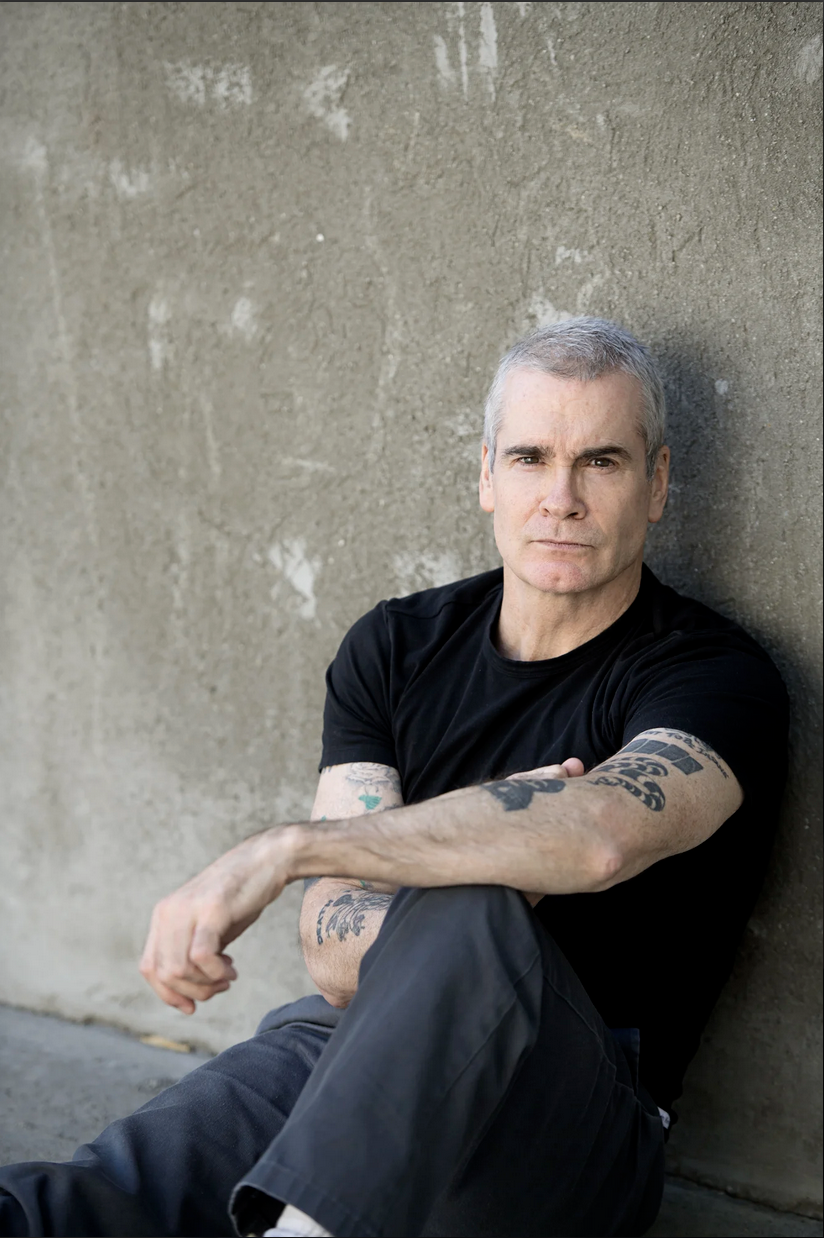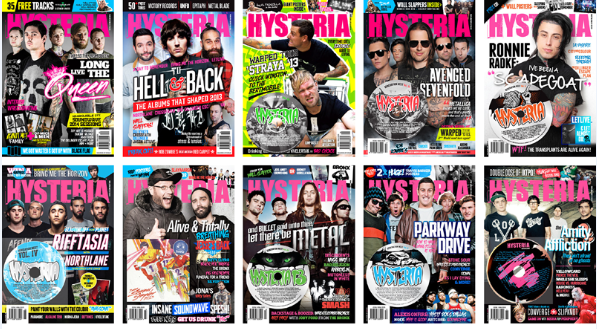Oh, lists. My mind works in lists, I think. I dream in lists. Lists form in my mind’s eye even when I don’t want them, let alone need them. 2024 seemed like a long year to me - this time last year feels like an eternity ago. If I ever cried poor at any point last year - it was because I spent a whole bunch of money on gigs and albums (about 90 of them combined) because I brace myself in quixotic defiance against Big Streaming who will never ever get a cent of my money.
I’m going to limit myself to ten albums - in no particular order - with a couple of honourable mentions to boot. As for what constitutes “metal” these days is a matter for keyboard warriors in comments sections. It is what it is.
Caligula’s Horse - Charcoal Grace
InsideOut Records
From my review at HysteriaMag.com:
The centrepiece of the album is the Rush by way of Dream Theater-esque Charcoal Grace suite, spanning four distinct movements. It opens with cinematic fret runs, leads into pensive piano, and finishes on guitar heroism worthy of the highest honours. Prey floats over the top of our senses, seguing effortlessly into A World Without, inspired by knotted technically ecstatic guitar as much as it is old school 70s prog-headedness like Camel or King Crimson…
Akin to the bombast and ceremony of their genre cousins in Wilderun or Scardust, Charcoal Grace marinates in sumptious grooves, a constant tension between the sublime and aggressive, and centrepiece instrumental and vocal performances. It all adds up to a cohesive, spellbinding whole. This is their landmark opus, the Caligula’s Horse album that will steal the crown from all that has come before. Progheads, rejoice!
High On Fire - Cometh the Storm
MNRK Heavy
I couldn’t believe that the Shirtless One (Matt Pike) hadn’t released a High on Fire album for six years. I suppose Pike’s been preoccupied with Sleep. The band, not the nocturnal restorative. Cometh the Storm’s freaks and geeks gallery is rounded out by Coady Willis (Melvins, Big Business, et. al.) and as a result, it sounds massive. Summoning Motörheaded riffage belted on to Pike’s apocalytpic caterwauling makes for a fine outing by the river Styx in the title track, and there’s more artyfacts and nuggets hidden in this record than your cardigan-wearing Greens voter aunty’s granny flat. There really aren’t any lulls on this album. It’s burning at every end, and makes a case for a new genre: functional stoner metal - the kinda guy that can choke down two or three billys before clock on and still operate heavy machinery for eight hours straight. Woof.
Black Sites - The Promised Land?
Self-Release
Think of an American prog band. Is it Dream Theater? Of course it is. (Could be Symphony X or Fates Warning, if you’re super duper special.) Odd today almost no one mentions Queensryche. No, they don’t use eight-string basses and fourteen different keyboards in 22/7 time, but are (were?) as high-concept as any given Rush album with a hard rocking musicianship to match. Dry of guitar wank instead of say, Scenes from a Memory, The Promised Land? is one of the best American prog concept records since Operation: Mindcrime. Mark Sugar and co. effortlessly blend thrash headbangers (Descent) and proto-metal gallopers (World on Fire) with the confidence and bombast of a decades-seasoned stadium-filler act. Gideon eases off the gas, plunging depths of despair and turmoil evoking Mindcrime protagonist Nikki’s fall from grace at the hands of Sister Mary. Their dynamic twelve-minute title track culminates in the triumph of journeying - and perhaps never finding - that promised land. It’s an enthralling listen from beginning to end. If you sleep on this, you’re crazy.
Flaming Wrekage - Terra Inferna
Grindhead Records
From my review, again:
Each track could be considered its own mini-symphony, seguing between sections seamlessly and creating their own unique and urgent textures and moods. Paralysis catches one off guard since it begins like a standard riffy boi but halts midway to play around with a crunchy, solitary motif; drums and bass nowhere to be heard. Leadwork explodes like fireworks amid Enduring Decay, culminating in the 80s denim-and-leather throwback Our Own Blood, tremelos a-go-go and quick-time percussion smacking headlong into towering walls of guitar. There’s so many holy shit moments in this record upon first blush, one only wonders how many we’ll pick up during subsequent listens.
Terra Inferna is as much as a celebration of the rich chainmail tapestries metal can weave as it is a testament to their blossoming as an incredible death metal force not to be wreked with. There’s only one way to play this record: loud and on repeat.
Evergrey - Theories of Emptiness
Napalm Records
This album blows me away every time I listen to it. Evergrey have achieved pop-prog apotheosis on Theories of Emptiness, right from bombastic opener Falling from the Sun, sadboi arena rocker Misfortune, and the duet we’ve all wanted (well, I have) since forever, Cold Dreams featuring Jonas Renkse (Katatonia). It lends off 80s power ballad vibes while maintaining an icy grip on bleak, barren soundscapes. Everything they approach, they nail; Queensryche-ian crunch, Pink Floyd-like leadwork, and soulful gospel choirs. It’s Evergrey done up to 11, much like their breakout Recreation Day. Outstanding work.
Suldusk - Anthesis
Napalm Records
After being blown away by their set prior to Katatonia this year (was it this year?) and sacrificing a meal or two to buy their prior album Lunar Falls, these Aussies knock it out of the gloomy moor with Anthesis. Plucking bits of the darker end of metal, neo-folk, and atmospherics, carried on the back of vocalist (and multi-instrumentalist) Emily Highfield’s sublime voice. It’s like the reincarnation of The Gathering rinsed in black, a majestic and ethereal follow-up to Green Carnation’s Light of Day, Day of Darkness in tone and musicianship. Album of the year contender, for sure.
And here it is!
Devenial Verdict - Blessing of Despair
Transcending Obscurity
This album begins with a big gulp of air, as if vocalist Riku Saressalo is about to plunge into fathomless icy depths - and it’s kind of the feeling one gets spinning up Blessing of Despair, blasting along spidery crawls of guitar and guttural lamentations that all seems to luminescence around the fringes. That’s just in first track I Have Become the Sun. This furious melancholy slithers through the entire album, sewn up with ear-melting musicianship, engineered to shift moods on a whim through the slightest suggestion. You’ll hear dervish-like Arabesques (The Quietus), bloodthirsty death marches (Solus), mouthwatering lashings of groove (Garden of Eyes), and epic dissonant takes on the genre that give (and gave) Ulcerate a run for their jandals (Moon-Starved). Death metal rarely has “it all” - but this disc definitely does.
Amiensus - Reclamation Parts I and II
M-Theory Audio
Progressive black metal (if that’s what we’re calling it) over these two ambitious discs is for want of a better word, beautiful. Yeah, it’s brutal as fuck at times but Reclamation Parts I and II (which should be taken as a whole) feels vibrant, resplendent, triumphant. Just like Wilderun or Disillusion before them, it’s a grand opus that takes in the wondrous spectrum of human emotion while retaining an overwhelming joy. It’s a joy evoked by the simple pleasure of listening to these sounds, as a haze between one’s internal world and the external settles in. A crowning achievement in the genre as it spans so many - folk, neo-classical, thrash, prog - because it will leave you in pure awe.
Unto Others - Never, Neverland
Century Media
From the hard yet jangly chords of opener Butterfly, Gabe Franco’s baritone croon, rich with metaphor comparing a difficult lover to a butterfly (I could win your heart with a melody / I could comfort you with a sweet serenade (I made) / Or I could lash my tongue in a criticism, yeah / Or put you down and pray for the tears in your eyes / I want you to die) you can just feel that this is album is dark magic pressed into thin perspex. It shifts from goth to crossover Suicidal Tendencies thrash (Momma Likes the Door Closed) to ironic post-punk meets Steinman pop (Angel of the Night) with such self-assuredness it’s almost criminal. This all occurs over three consecutive tracks, by the way. What’s even more incredible is that some of these mouthwatering cuts clock in at 7” 45 lengths: a punchy Fame, a punky Flatline, or a satisfying morsel of Blue Oyster Cult worship Hoops. It all feels like Lt. Tuck Pendleton’s bittersweet lament in Innerspace: “When things are at their darkest pal, it’s a brave man who can kick back and party.” So Unto Others did. And we reaped the benefits.
Cemetery Skyline - Nordic Gothic
Century Media
In a way, it was inevitable. We should be grateful for its inevitability. Spearheaded by Mikael Stanne (Dark Tranquillity, Grand Cadaver, The Halo Effect) and featuring members of Insomnium, The Man-Eating Tree, Dimmu Borgir, and Amorphis both past and present, this is like the Nordic (and gothic) Power Station, featuring Robert Palmer plus Chic and Duran Duran members in. Ever since 1999’s Projector, Dark Tranquillity embraced goth wholesale via Martin Brandstrom’s Depeche Mode electronics. Freed from shackles of melodic death, Nordic Gothic is pure pale light reflected in nightime clouds electro-goth beating with a blue and yellow Scandinavian heart. A yearning despondence throbs through this disc, whether it’s inviting absent-minded swaying about chessboard dancefloors (Torn Away) or whiskey-and-regret drowned metal and synthpop after midnight (Violent Storm). Thanks to hindsight and maturity, cribbing bits of a-ha (yeah, they were kinda goth) and Lacrimosa and varnishing it all over with an unmistakeable 1980s Scandi-pop sheen (c.f. Never Look Back) sounds fresh, moody, and forever enticing. If you’re even goth-curious, it’s a must listen.
TEN HONOURABLE MENTIONS 2024
Iotunn - Kinship
Hamferð - Men Guðs hond er sterk
Vale of Pnath - Between The Worlds Of Life And Death
Sworn - A Journey Told Through Fire
Carnosus - Wormtales
Gaerea - Coma
Blood Incantation - Absolute Elsewhere
Officium Triste - Hortus Veneum
Oceans of Slumber - Where Gods Fear to Speak
In Vain - Solemn













